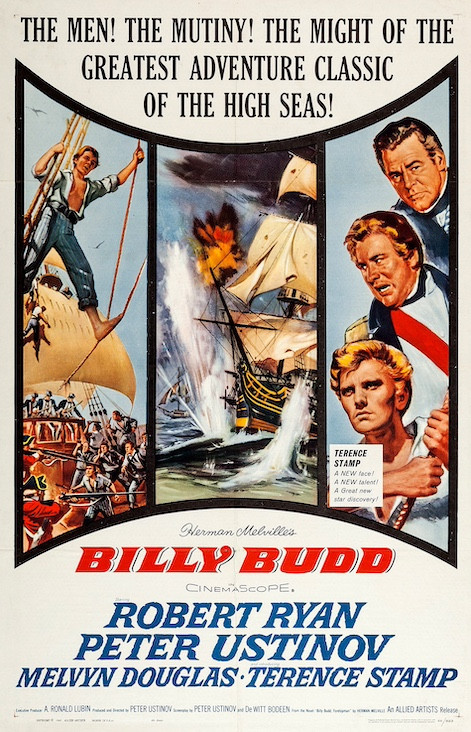Out of the Breadbox: Melville’s “Billy Budd” Centennial, A Cultural Collaboration
Three Berkshire County cultural organizations are bringing Melville's work to life to celebrate its publishing centennial.

Three Berkshire County cultural organizations are bringing Melville's work to life to celebrate its publishing centennial.

History and literature buffs, this one's for you.
“Nobody knows how finished it really is,” says Lesley Herzberg, Berkshire Historical Society’s executive director, located at Arrowhead, Herman Melville’s farmstead in Pittsfield. She’s referring to Herman Melville’s novella, Billy Budd, Sailor, written in the last five years of his life. Melville’s wife (“Lizzy” to Historical Society folks) had hidden the handwritten manuscript in a tin breadbox, which Melville’s granddaughter, Eleanor Melville Metcalf, discovered in 1906 in the attic of her home in New Jersey. She was helping Raymond Weaver, a Columbia University professor, who was writing the first biography of Melville.

“Questions surround it,” Herzberg says. Over the years, Lizzy made edits, so some of them were hers and some were Melville’s. There are inconsistencies, like the ship’s name changing mid story. “But if anyone was going to put together something for publication, it was Weaver, along with Melville’s granddaughter, who knew him,” says Herzberg. The novella was first published in 1924, and the Berkshire Historical Society is going all out celebrating its centennial, with events and programs related to the book in the next couple of months.
People who know the Melville oeuvre look at it as one of his best books, Herzberg says. It’s a return to his seafaring stories that made him popular in the first place. Also, it’s shorter, so a more manageable read. “Melville is playing with questions of right or wrong, morality, basic human questions and emotions,” says Herzberg.
Kicking off the events is the Billy Budd, Sailor Gala on September 20, a collaboration of the Historical Society, the Linde Center for Music and Learning at Tanglewood, and the Berkshire Opera Festival. The organizations are producing an evening of selections from the opera “Billy Budd, Sailor” by Benjamin Britten, paired with readings from the novella featuring actor Ryan Winkles. Desserts and cocktails will follow the performance at the Linde Center in Lenox.
“We always knew that this opera existed, but we also knew it was a really big lift for any opera company to put on,” Herzberg says. Still, with an opera company practically just down the road, it was a logical move to inquire if it wanted to take part. The response was positive.
“The opera is gigantic, but we said, let’s think about what we’re able to do,” reports Kyra Saltman, Berkshire Opera Festival’s operations manager. “What if we did a collection of arias, plus some readings from the novel? It would give people a taste of the opera on a smaller scale.”
Geoffrey Larson, the Festival’s chorus master and assistant conductor, chose the excerpts. Brian Garman, artistic director and co-founder of the Festival, regularly coaches young singers and selected the soloists from a talented network.
The centennial celebration and collaborations continue on November 13 with a screening of the 1962 film “Billy Budd” directed by Peter Ustinov at the Beacon Cinema in Pittsfield, which procured the rights for the Historical Society to show it. The film will be introduced by Richard Matturro, an Arrowhead docent and a former literature professor at the University of Albany.
For kids, the Historical Society is planning to offer two story circles in recognition of Melville’s granddaughter’s role in the discovery of Billy Budd, Sailor. An oral history project with the Berkshire Athenaeum (Pittsfield’s public library) and the Housatonic Heritage Oral History Center, it will provide booths for grandparents and grandchildren to record the stories they share with one another (one event will take place in Herman Melville’s parlor at Arrowhead). While the families will be given access to their conversations, the recordings will also be preserved in the Herman Melville Memorial Room at the Athenaeum. The story circles are funded in part by a grant from Mass Humanities.
The Athenaeum will also host an ongoing exhibit in the Melville Room exploring the novella, including the desk Melville used when writing it in his New York apartment and — get this — the actual breadbox in which the manuscript was found.
All told, it’s history and literature at its best. It’s also a prime example of community collaborations, with all three organizations excited about the programming. For the Linde Center, this is one of their first opportunities to engage in an expressed interest of becoming more of a community partner.
Says the Historical Society’s website: “The novella posthumously brought Melville out of obscurity, ensuring his place among America’s literary giants.” Now we can add: And inspired a centennial celebration, one that brought together history, literature, and some of the leading cultural organizations in the Berkshires to make it happen.
Thanks, Herman!

